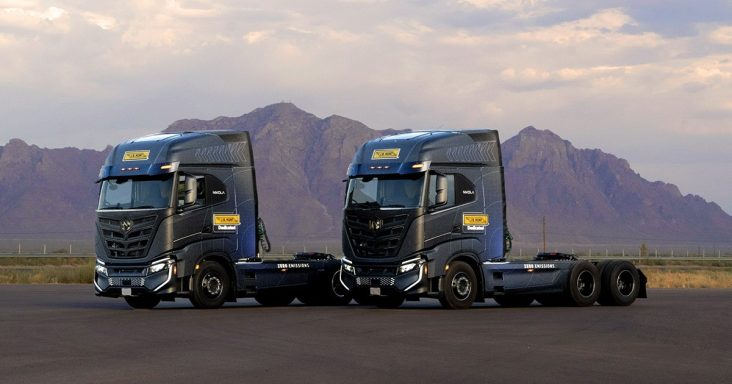J.B. Hunt buys Nikola electric trucks for operations in West
by July 31, 2023 3:53 pm 2,308 views

Lowell-based carrier J.B. Hunt Transport Services Inc. will purchase 13 zero-emission electric trucks from Phoenix-based manufacturer Nikola Corp., according to a Monday (July 31) news release. The announcement to acquire 10 battery-electric and three hydrogen fuel-cell trucks came after shares of J.B. Hunt hit a 52-week high on Friday (July 28).
Nikola is expected to start delivering the vehicles in August. The carrier will use the new trucks in the Los Angeles and Phoenix areas. Both the battery-electric and hydrogen fuel-cell trucks are class 8 trucks, the largest truck class.
According to the news release, J.B. Hunt received its first company-owned class 8 electric vehicle in the fourth quarter of 2022. The carrier completed its first delivery with a class 8 electric truck in 2020. It began adding electric trucks to its fleet in 2018 with the addition of five class 4 Mitsubishi Fuso eCanter trucks.
Nick Hobbs, chief operating officer and president of contract services at J.B. Hunt, noted the Fuso eCanter trucks were not company owned and that the first company-owned battery electric vehicle was a Freightliner eCascadia. The company received the first in December and has since added four more eCascadia trucks to its fleet. The company started piloting the truck in 2020.
In 2017, J.B. Hunt reserved 40 Tesla Semi trucks for West Coast operations. Asked about the Tesla deal, Hobbs said the company didn’t have an update to share at this time.
Multiple outlets, including Forbes, have reported the battery-electric Nikola truck exceeds $300,000, and its hydrogen-electric truck is expected to be similarly priced. That is about twice as much as a diesel-powered big rig.
The Nikola website shows the total cost of ownership is mitigated by lower fuel and maintenance costs compared to a diesel truck. The hydrogen-electric truck can qualify for incentives up to $288,000 per truck. The battery-electric truck is eligible for incentives up to $150,000 per truck. The 645-horsepower battery-electric truck has a 330-mile range and can be charged to 80% in 90 minutes. The 536-horsepower hydrogen-electric truck has a 500-mile range and can be refueled in less than 20 minutes.
According to Nikola, the systems responsible for generating electricity to power the electric drivetrains are the batteries for the battery-electric vehicle and hydrogen fuel cells for the hydrogen-electric vehicle. The fuel cells convert hydrogen into electric power by combining hydrogen with oxygen. The hydrogen-electric vehicle still has a battery to assist with acceleration and store energy through regenerative braking.
Nikola’s hydrogen arm will supply the hydrogen and fueling infrastructure for J.B. Hunt’s new trucks.
“It’s important for us to be at the forefront of new technologies and innovative solutions that have the potential to change the way we move freight,” Hobbs said. “These zero-emission trucks from Nikola advance our process toward achieving our ambitious goal to reduce carbon emission intensity through viable solutions.”
In mid-November, J.B. Hunt announced a goal to cut its carbon emission intensity by 32% by 2034 from 2019 levels. Adding alternative-powered vehicles into its fleet was one of the focus areas in reaching the goal.
Shares of J.B. Hunt (NASDAQ: JBHT) closed Monday at $203.94, down $1.60 or 0.78%. In the past 52 weeks, the stock has ranged between $156.28 and $206.21. The stock reached the 52-week high on Friday. Before Wednesday (July 26), the last time the stock closed above $200 was March 31, 2022.
